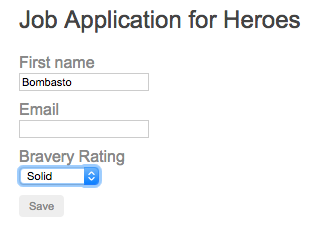# 构建动态表单
许多表单(比如问卷)可能在格式和意图上都非常相似。为了更快更轻松地生成这种表单的不同版本,你可以根据描述业务对象模型的元数据来创建动态表单模板。然后就可以根据数据模型中的变化,使用该模板自动生成新的表单。
如果你有这样一种表单,其内容必须经常更改以满足快速变化的业务需求和监管需求,该技术就特别有用。一个典型的例子就是问卷。你可能需要在不同的上下文中获取用户的意见。用户要看到的表单格式和样式应该保持不变,而你要提的实际问题则会因上下文而异。
在本教程中,你会构建一个渲染基本问卷的动态表单。你要为正在找工作的英雄们建立一个在线应用。英雄管理局会不断修补应用流程,但是借助动态表单,你可以动态创建新的表单,而无需修改应用代码。
本教程将指导你完成以下步骤。
- 为项目启用响应式表单。
- 建立一个数据模型来表示表单控件。
- 使用范例数据填充模型。
- 开发一个组件来动态创建表单控件。
你创建的表单会使用输入验证和样式来改善用户体验。它有一个 Submit 按钮,这个按钮只会在所有的用户输入都有效时启用,并用色彩和一些错误信息来标记出无效输入。
这个基本版可以不断演进,以支持更多的问题类型、更优雅的渲染体验以及更高大上的用户体验。
参阅 现场演练/ 下载范例。
# 前提条件
在做本教程之前,你应该对下列内容有一个基本的了解。
- TypeScript和 HTML5 编程
- Angular 应用设计的基本概念
- 响应式表单的基础知识
# 为项目启用响应式表单
动态表单是基于响应式表单的。为了让应用访问响应式表达式指令,根模块会从 @angular/forms 库中导入 ReactiveFormsModule。
以下代码展示了此范例在根模块中所做的设置。
app.module.ts
main.ts
import { BrowserModule } from '@angular/platform-browser';
import { ReactiveFormsModule } from '@angular/forms';
import { NgModule } from '@angular/core';
import { AppComponent } from './app.component';
import { DynamicFormComponent } from './dynamic-form.component';
import { DynamicFormQuestionComponent } from './dynamic-form-question.component';
@NgModule({
imports: [ BrowserModule, ReactiveFormsModule ],
declarations: [ AppComponent, DynamicFormComponent, DynamicFormQuestionComponent ],
bootstrap: [ AppComponent ]
})
export class AppModule {
constructor() {
}
}
import { platformBrowserDynamic } from '@angular/platform-browser-dynamic';
import { AppModule } from './app/app.module';
platformBrowserDynamic().bootstrapModule(AppModule)
.catch(err => console.error(err));
# 创建一个表单对象模型
动态表单需要一个对象模型来描述此表单功能所需的全部场景。英雄应用表单中的例子是一组问题 - 也就是说,表单中的每个控件都必须提问并接受一个答案。
此类表单的数据模型必须能表示一个问题。本例中包含 DynamicFormQuestionComponent,它定义了一个问题作为模型中的基本对象。
这个 QuestionBase 是一组控件的基类,可以在表单中表示问题及其答案。
src/app/question-base.ts
export class QuestionBase<T> {
value: T|undefined;
key: string;
label: string;
required: boolean;
order: number;
controlType: string;
type: string;
options: {key: string, value: string}[];
constructor(options: {
value?: T;
key?: string;
label?: string;
required?: boolean;
order?: number;
controlType?: string;
type?: string;
options?: {key: string, value: string}[];
} = {}) {
this.value = options.value;
this.key = options.key || '';
this.label = options.label || '';
this.required = !!options.required;
this.order = options.order === undefined ? 1 : options.order;
this.controlType = options.controlType || '';
this.type = options.type || '';
this.options = options.options || [];
}
}
# 定义控件类
此范例从这个基类派生出两个新类,TextboxQuestion 和 DropdownQuestion,分别代表不同的控件类型。当你在下一步中创建表单模板时,你会实例化这些具体的问题类,以便动态渲染相应的控件。
| 控制类型 | 详细信息 |
|---|---|
TextboxQuestion 控件类型 | 表示问题并让用户输入。src/app/question-textbox.ts |
import { QuestionBase } from './question-base';
export class TextboxQuestion extends QuestionBase<string> {
override controlType = 'textbox';
}
TextboxQuestion 控件类型将使用 `` 元素表示在表单模板中。该元素的 type 属性将根据 options 参数中指定的 type 字段定义(比如 text,email,url)。 |
| DropdownQuestion 控件类型 | 表示在选择框中的一个选项列表。src/app/question-dropdown.ts
import { QuestionBase } from './question-base';
export class DropdownQuestion extends QuestionBase<string> {
override controlType = 'dropdown';
}``` |
### 编写表单组
动态表单会使用一个服务来根据表单模型创建输入控件的分组集合。下面的 `QuestionControlService` 会收集一组 `FormGroup` 实例,这些实例会消费问题模型中的元数据。你可以指定一些默认值和验证规则。
src/app/question-control.service.ts
```js
import { Injectable } from '@angular/core';
import { FormControl, FormGroup, Validators } from '@angular/forms';
import { QuestionBase } from './question-base';
@Injectable()
export class QuestionControlService {
constructor() { }
toFormGroup(questions: QuestionBase<string>[] ) {
const group: any = {};
questions.forEach(question => {
group[question.key] = question.required ? new FormControl(question.value || '', Validators.required)
: new FormControl(question.value || '');
});
return new FormGroup(group);
}
}
# 编写动态表单内容
动态表单本身就是一个容器组件,稍后你会添加它。每个问题都会在表单组件的模板中用一个 `` 标签表示,该标签会匹配 DynamicFormQuestionComponent 中的一个实例。
DynamicFormQuestionComponent 负责根据数据绑定的问题对象中的各种值来渲染单个问题的详情。该表单依靠 [formGroup\] 指令来将模板 HTML 和底层的控件对象联系起来。DynamicFormQuestionComponent 会创建表单组,并用问题模型中定义的控件来填充它们,并指定显示和验证规则。
dynamic-form-question.component.html
<div [formGroup]="form">
<label [attr.for]="question.key">{{question.label}}</label>
<div [ngSwitch]="question.controlType">
<input *ngSwitchCase="'textbox'" [formControlName]="question.key"
[id]="question.key" [type]="question.type">
<select [id]="question.key" *ngSwitchCase="'dropdown'" [formControlName]="question.key">
<option *ngFor="let opt of question.options" [value]="opt.key">{{opt.value}}</option>
</select>
</div>
<div class="errorMessage" *ngIf="!isValid">{{question.label}} is required</div>
</div>
dynamic-form-question.component.ts
import { Component, Input } from '@angular/core';
import { FormGroup } from '@angular/forms';
import { QuestionBase } from './question-base';
@Component({
selector: 'app-question',
templateUrl: './dynamic-form-question.component.html'
})
export class DynamicFormQuestionComponent {
@Input() question!: QuestionBase<string>;
@Input() form!: FormGroup;
get isValid() { return this.form.controls[this.question.key].valid; }
}
DynamicFormQuestionComponent 的目标是展示模型中定义的各类问题。你现在只有两类问题,但可以想象将来还会有更多。模板中的 ngSwitch 语句会决定要显示哪种类型的问题。这里用到了带有 formControlName和formGroup选择器的指令。这两个指令都是在 ReactiveFormsModule 中定义的。
# 提供数据
还要另外一项服务来提供一组具体的问题,以便构建出一个单独的表单。在本练习中,你将创建 QuestionService 以从硬编码的范例数据中提供这组问题。在真实世界的应用中,该服务可能会从后端获取数据。重点是,你可以完全通过 QuestionService 返回的对象来控制英雄的求职申请问卷。要想在需求发生变化时维护问卷,你只需要在 questions 数组中添加、更新和删除对象。
QuestionService 以一个绑定到 @Input() 的问题数组的形式提供了一组问题。
src/app/question.service.ts
import { Injectable } from '@angular/core';
import { DropdownQuestion } from './question-dropdown';
import { QuestionBase } from './question-base';
import { TextboxQuestion } from './question-textbox';
import { of } from 'rxjs';
@Injectable()
export class QuestionService {
// TODO: get from a remote source of question metadata
getQuestions() {
const questions: QuestionBase<string>[] = [
new DropdownQuestion({
key: 'brave',
label: 'Bravery Rating',
options: [
{key: 'solid', value: 'Solid'},
{key: 'great', value: 'Great'},
{key: 'good', value: 'Good'},
{key: 'unproven', value: 'Unproven'}
],
order: 3
}),
new TextboxQuestion({
key: 'firstName',
label: 'First name',
value: 'Bombasto',
required: true,
order: 1
}),
new TextboxQuestion({
key: 'emailAddress',
label: 'Email',
type: 'email',
order: 2
})
];
return of(questions.sort((a, b) => a.order - b.order));
}
}
# 创建一个动态表单模板
DynamicFormComponent 组件是表单的入口点和主容器,它在模板中用 `` 表示。
DynamicFormComponent 组件通过把每个问题都绑定到一个匹配 DynamicFormQuestionComponent 的 `` 元素来渲染问题列表。
dynamic-form.component.html
<div>
<form (ngSubmit)="onSubmit()" [formGroup]="form">
<div *ngFor="let question of questions" class="form-row">
<app-question [question]="question" [form]="form"></app-question>
</div>
<div class="form-row">
<button type="submit" [disabled]="!form.valid">Save</button>
</div>
</form>
<div *ngIf="payLoad" class="form-row">
<strong>Saved the following values</strong><br>{{payLoad}}
</div>
</div>
dynamic-form.component.ts
import { Component, Input, OnInit } from '@angular/core';
import { FormGroup } from '@angular/forms';
import { QuestionBase } from './question-base';
import { QuestionControlService } from './question-control.service';
@Component({
selector: 'app-dynamic-form',
templateUrl: './dynamic-form.component.html',
providers: [ QuestionControlService ]
})
export class DynamicFormComponent implements OnInit {
@Input() questions: QuestionBase<string>[] | null = [];
form!: FormGroup;
payLoad = '';
constructor(private qcs: QuestionControlService) {}
ngOnInit() {
this.form = this.qcs.toFormGroup(this.questions as QuestionBase<string>[]);
}
onSubmit() {
this.payLoad = JSON.stringify(this.form.getRawValue());
}
}
# 显示表单
要显示动态表单的一个实例,AppComponent 外壳模板会把一个 QuestionService 返回的 questions 数组传给表单容器组件 ``。
app.component.ts
import { Component } from '@angular/core';
import { QuestionService } from './question.service';
import { QuestionBase } from './question-base';
import { Observable } from 'rxjs';
@Component({
selector: 'app-root',
template: `
<div>
<h2>Job Application for Heroes</h2>
<app-dynamic-form [questions]="questions$ | async"></app-dynamic-form>
</div>
`,
providers: [QuestionService]
})
export class AppComponent {
questions$: Observable<QuestionBase<any>[]>;
constructor(service: QuestionService) {
this.questions$ = service.getQuestions();
}
}
这个例子为英雄提供了一个工作申请表的模型,但是除了 QuestionService 返回的对象外,没有涉及任何跟英雄有关的问题。这种模型和数据的分离,允许你为任何类型的调查表复用这些组件,只要它与这个问题对象模型兼容即可。
# 确保数据有效
表单模板使用元数据的动态数据绑定来渲染表单,而不用做任何与具体问题有关的硬编码。它动态添加了控件元数据和验证标准。
要确保输入有效,就要禁用 “Save” 按钮,直到此表单处于有效状态。当表单有效时,你可以单击 “Save” 按钮,该应用就会把表单的当前值渲染为 JSON。
最终的表单如下图所示。

# 后续步骤
| 步骤 | 详细信息 |
|---|---|
| 不同类型的表单和控件集合 | 本教程展示了如何构建一个问卷,它只是一种动态表单。这个例子使用 FormGroup 来收集一组控件。关于不同类型动态表单的范例,参阅在响应式表单中的创建动态表单一节。那个例子还展示了如何使用 FormArray 而不是 FormGroup 来收集一组控件。 |
| 验证用户输入 | 验证表单输入部分介绍了如何在响应式表单中进行输入验证的基础知识。 表单验证指南更深入地介绍了该主题。 |
